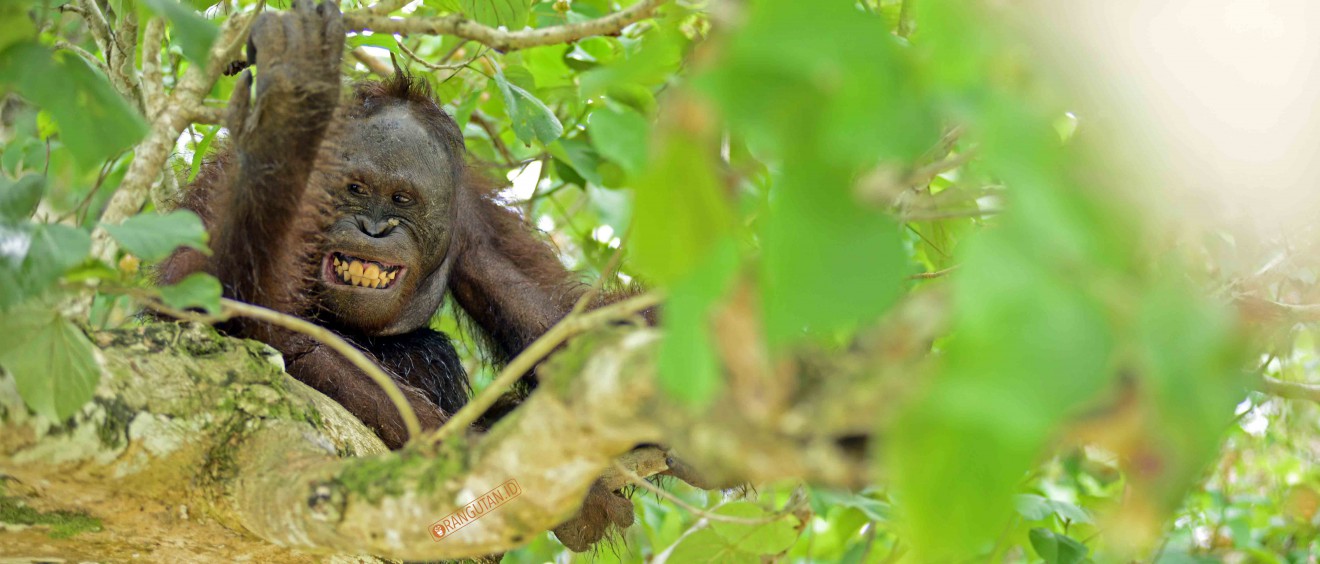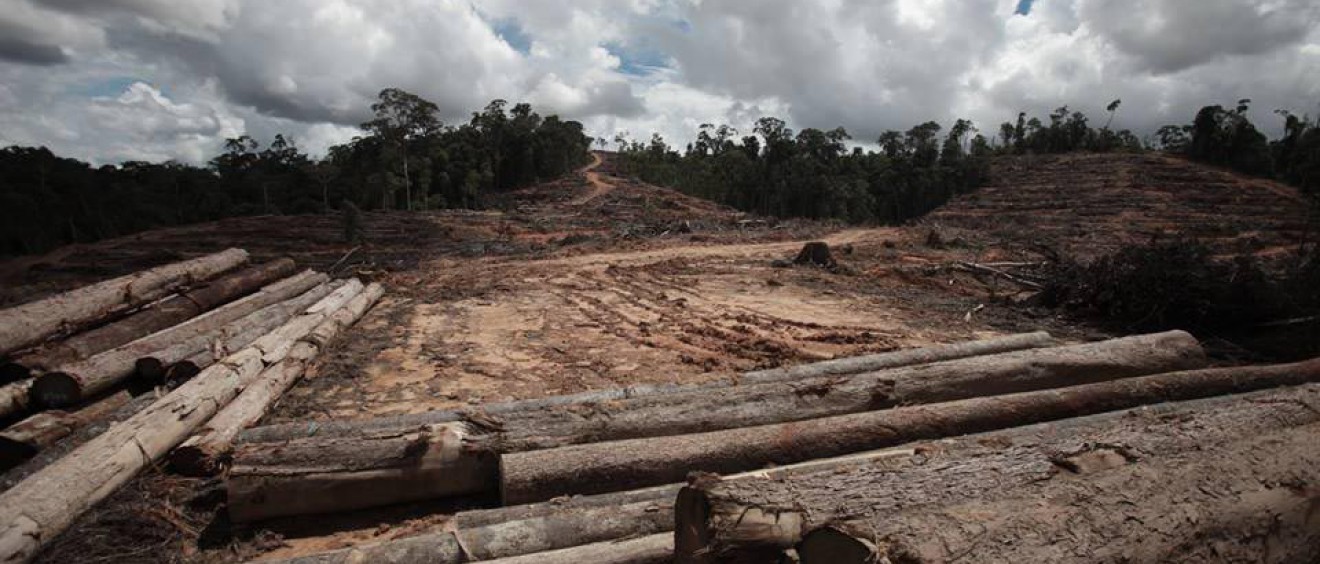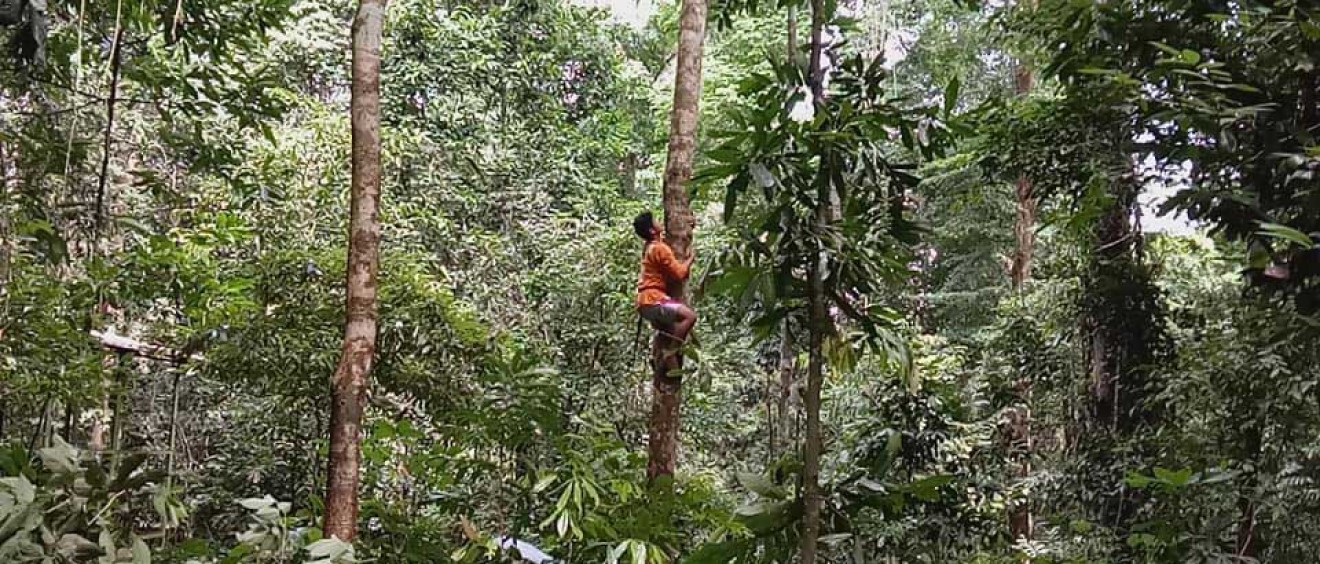He is Untung, a lucky orangutan with imperfect fingers who can compete in the COP Borneo pre-release island. In 2011, when Centre for Orangutan Protection took him to the school forest for the first time, he looked scared, his body trembled while hugging the branch of tree. His confidence was lacking. COP staffs patiently accompanied him, talked to him with deep voice, and gently fondled him. On the next forest school, Untung had to grab fruits between branches for his meal. His hunger guided him to reach the banana. From that day onward, we believe that Untung will be back to its habitat one day.
Almost 8 years has passed. Going back and forth inside and outside the cage to teach him that he’d better avoid humans whenever they approaches him with a long pipe. He would then made voices to scare people. And whenever our eyes met, he would looked at us with dislike. Untung is getting wilder.
The pre-release island is surrounded by river and is dominated by the orangutan release candidates. the animal keeper will only stop by to put some foods in the morning and evening, to complement the natural food that is available on the island. Untung’s grumpy attitude was always on to drive away the on-duty animal keepers without exception.
Thankfully, Untung succeeded this stage. Release preparations have also begun.”, explained Jhony, the coordinator of COP Borneo animal keepers in Berau, East Kalimantan. Untung will be one of the second orangutan who had entered a zoo and went to COP Borneo rehabilitation centre to be released. COP Bornea has succeeded with Oki orangutans, the one from Mulawarman University Botanical Garden, Samarinda. Now it is Untung turn! (SAR)
GILIRAN UNTUNG UNTUK KEMBALI KE RUMAH
Dia adalah Untung, orangutan yang beruntung walau dengan jari yang tidak sempurna mampu bersaing di kelas pulau pra rilis orangutan COP Borneo. Untung di tahun 2011 saat Centre for Orangutan Protection mengajaknya pertama kali ke sekolah hutan, Untung terlihat ketakutan, tubuhnya bergetar memeluk dahan. Terlihat rasa percaya dirinya yang sangat porak poranda. Dengan telaten, staf COP menemaninya, berbicara dengan suara rendah dan membelai punggungnya dengan lembut. Saat sekolah hutan berikutnya, Untung harus meraih buah-buahan sebagai makanannya di antara dahan. Rasa laparnya menuntunnya meraih pisang. Saat itulah, kami yakin, kelak Untung akan kembali ke habitatnya.
Hampir delapan tahun berlalu. Bolak balik ke luar kandang mengajarkannya, saat seseorang dengan pipa panjang mendekatinya, sebaiknya dia menghindar. Dia pun akan segera mengeluarkan suara untuk mengusir. Dan saat kita bertatapan, dia pun melihat kita dengan kebencian. Untung semakin meliar.
Pulau pra rilis orangutan adalah sebuah pulau yang dibatasi oleh sungai. Pulau mutlak dikuasai oleh orangutan-orangutan kandidat pelepasliaran. Hanya pada saat pagi dan sore hari, para animal keeper akan berlabuh sesaat di dermaganya untuk meletakkan makan pagi dan sore sebagai tambahan dari makanan yang sudah tersedia secara alami di pulau. Sikap galak Untung pun tanpa terkecuali, dengan galak dia berekspresi, mengusir para animal keeper yang bertugas.
“Syukurlah, Untung berhasil pada tahapan ini. Persiapan untuk pelepasliarannya pun sudah dimulai.”, jelas Jhony, koordinator animal keeper di pusat rehabilitasi orangutan COP Borneo, Berau, Kalimantan Timur. Untung akan menjadi orangutan kedua yang pernah di kebun binatang dan masuk pusat rehabilitasi COP Borneo untuk dilepasliarkan. COP Borneo telah berhasil dengan orangutan Oki, orangutan dari Kebun Raya Unviversitas Mulawarman, Samarinda. Kini giliran Untung!



